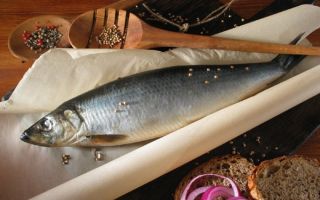Content
- 1 What does herring look like and where is found
- 2 Varieties of herring
- 3 The chemical composition of herring
- 4 How many calories are in herring
- 5 Why is herring useful?
- 6 Can herring be pregnant and lactating women
- 7 At what age can herring be given to children
- 8 The benefits of herring for weight loss
- 9 Is herring allowed for diabetes?
- 10 Herring with pancreatitis
- 11 Does herring lose its properties when cooked?
- 12 How to carve a herring
- 13 How to pickle herring
- 14 Harm of herring and contraindications to use
- 15 How to choose the right herring
- 16 How and how much herring can be stored
- 17 Conclusion
- 18 Reviews
It is quite difficult to imagine any meal without the traditional delicacy - herring: with onions or under a fur coat. However, not everyone knows what the real benefits and harms of herring are - this will be discussed further.
What does herring look like and where is found
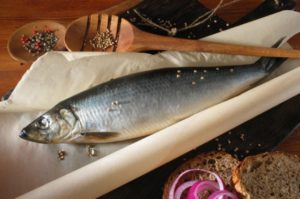
It is rather difficult to call herring a large fish - its body reaches about 35 - 40 cm in length, and its weight varies within 500 - 700 g. The body of the fish is slightly flattened on the sides, from above it is covered with moderate or large thin scales. On the back, painted in olive or grayish color, there is the "main" fin, and below it is the pelvic fin. The tail fin of the fish differs from others in its characteristic small notch.
A keel covered with slightly pointed scales runs along the silvery abdomen. On the head of the fish are deep-set eyes. Herring's teeth are very weak or completely absent, the lower jaw is better developed and protrudes slightly beyond the upper jaw.
It is believed that the average life span of a herring is up to 25 years, and today there are few centenarians.
The herring itself is a schooling fish. It feeds mainly on zooplankton, but at the same time itself is a source of food for other fish and predators.
If we talk about the habitats of herring, then most often, they are found in the northern parts of the Atlantic Ocean: on the shores of Europe, North America and South Greenland, in the waters of the Bay of Biscay, the Baltic Sea; as well as in the Pacific Ocean. In fresh water, herring lives in rivers, mainly in the Dnieper, Volga and Don. It often lives far from the coast, closer to the surface of the water, without sinking below 300 m in depth.
Varieties of herring
In total, there are about 60 species of herring, consider the most basic and most popular among them.
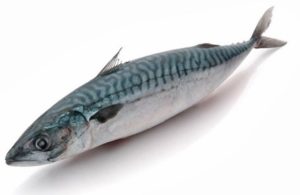
Mackerel is considered one of the most common fish. This type of herring lives in the North and Norwegian Seas - there it is caught during the warm season. Mackerel is a fast-swimming fish with a lifespan of about 20 years. It belongs to the class of predators, and that is why it reaches a rather impressive size. It is considered a delicacy in cooking, and the most popular dish with its participation is mackerel in sour cream sauce.
The next type of herring is the Black Sea herring, which usually lives in the Black and Azov seas. In its height it reaches 40 cm. It is especially popular with fishermen, and pickles of this type are most often sold on the shelves of shops and markets.
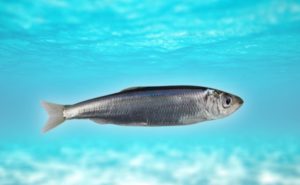
One of the varieties of herring is found at almost all depths - this is the Pacific herring.It is one of the largest, since it reaches about 50 cm in length and weighs more than 700 g. It is she who contains the greatest amount of iodine in her meat than other species, and therefore has undoubted benefits: the lack of this element in the body is becoming one of the most frequent problems these days. It is most popular in Russia, Japan and the USA. Moreover, it is the Pacific herring that is most often found in the photo, as the most common species all over the world.
Somewhere in the depths of the Baltic Sea, another relative of herring lives - herring. This is a small fish, about 20 cm long and weighing about 400 g. All its life it feeds exclusively on plankton. It is often eaten in a salty form. Another popular species swims in these waters - the Baltic sprat: these babies are caught off the coast of New Zealand and harvested in the form of canned food.
Another popular, and on the other hand, an unusual representative of herring, is the Iwashi fish. Looking at it, it is not so easy to determine which of the species of fish it belongs to - it hardly looks like a herring. In fact, it is: the fish belongs to the genus of sardines, but since Soviet times it has become a cult representative of herring. Its weight is about 100 g, and its length barely reaches 20 cm.
The chemical composition of herring

Most of the beneficial properties of herring are due to its rich chemical composition, which includes:
- Fat - 1 to 35%. The concentration of fat depends on the water in which the fish was caught: the closer to the north the herring swims, the more fat it contains.
- Protein - 16 - 20%. Among herring proteins, there are essential amino acids - the body is not able to produce them on its own, so it has to take them from the food we eat. Therefore, the benefits of herring as a product containing them are highly valued by nutritionists.
- Vitamins A and D play an essential role for the human body due to their beneficial properties to provide the supply of substances necessary for the organs of vision, promote the formation of carotene, help the body accumulate energy to maintain homeostasis, and also stimulate the human immune system.
- Oleic acid has properties to improve the functioning of the cardiovascular system and improve cerebral circulation.
The composition of fish also includes a whole set of minerals: calcium, cobalt, phosphorus, manganese, potassium, copper, iodine and others - a good half of the elements of the periodic table, which provides herring with the benefit of comprehensively satisfying the body's needs for the basic substances we need.
How many calories are in herring
The calorie content of herring is considered average - 100 g of the product contains about 165-170 kcal. Those who follow a low-calorie diet should pay attention to the following: despite the fact that herring is not the fattest fish, it has much more calories than in such varieties of river fish as perch, carp or pike.
The calorie content of herring also largely depends on how it is cooked.
- So, the smallest amount of calories is contained in pickled (about 155-160 kcal per 100 g of product) and fried (190 kcal / 100 g) herring;
- The smoked analogue has a slightly higher calorie content - about 225 kcal per 100 g;
- Salted herring is recognized as the most nutritious - about 275 kcal per 100 g;
- In slightly salted herring, the indicators are slightly lower - about 240-250 kcal per 100 g.
According to nutritionists, fatty fish should be consumed 1-3 times a week to minimize harm to the body.
Thus, it is quite easy to calculate the ideal portion for yourself. If it is difficult to give up salted fish, you can give preference to slightly salted herring.
Why is herring useful?

One of the most important factors in the benefits of herring for the human body is the presence in it of such an element as selenium, which is a natural antioxidant and has the ability to reduce oxidation products in our blood.
Herring also contains a large amount of fatty acids. Omega-3, which are of particular value for the body, since they have a positive effect on the organs of hearing and vision, which is why doctors so often prescribe herring to children. Experts have confirmed that by including the product in the diet, you can significantly reduce the risk of harm to the development of heart disease and atherosclerosis.
When consuming herring, excess cholesterol and various toxins harmful to the body are removed from the body, and the content of high-quality, easily digestible proteins, which are necessary for the construction of cells, including muscle tissue, increases. Slightly salted herring is the richest in useful proteins, therefore, it carries considerable benefits for the development of the body.
For women
Herring is a product that benefits a woman's body. And it is most valuable for those who care about their physical shape - after all, such fish can be eaten regularly, while without harm to the figure. It is only important to remember the fact that the calorie content of herring directly depends on the method of its preparation.
Herring has another beneficial property for women - it improves hormonal balance and reduces the risk of infertility, which provides acid content.
Herring has found its use even in cosmetology: trace elements in its composition can improve the condition of the skin, hair and nails, and fat and eggs are used to make useful products for skin care (creams, masks, etc.).
For men
One cannot but appreciate the benefits of herring for men. It is known that more than 80% of cases of erection problems are caused by a violation of the structures of the vascular walls. The beneficial omega-3 fatty acids contained in herring have a positive effect on blood vessels, improving their elasticity. Thus, by including herring in the diet, you can prevent the harm of impotence.

For seniors
It is no longer a secret that Omega-3 fatty acids in herring are able to work wonders with the heart and blood vessels of a person - thanks to their benefits, they prevent the appearance of heart diseases, vasodilation, and reduce the amount of cholesterol in the blood. What's more, Omega-3s are able to increase the production of so-called good cholesterol, which in turn reduces the risk of atherosclerosis, stroke and heart attack. Herring's properties are also perfect for people suffering from hypertension - with its regular use, blood pressure normalizes.
For athletes
For people who are constantly engaged in physical activity, herring is one of the most important elements of a healthy protein diet, almost on a par with eggs, cottage cheese and meat. Moreover, the property of herring meat is absorbed by the body many times more than beef or chicken.
Herring is rich in amino acids, the benefits of which are to help the growth of muscle mass, as well as keratin, an essential building block of hair. This element, due to its ability to restore the balance of ATP, plays a major role during physical activity. With a lack of ATP, the body is threatened with the harm of fatigue, decreased activity and working capacity.
Can herring be pregnant and lactating women

Due to the content of uniquely beneficial Omega-3 fatty acids in herring, it is strongly recommended to use it during pregnancy - acids and minerals are beneficial, positively affecting the correct development of the organs of vision and brain cells in a growing fetus.
As for the period of breastfeeding, here the mother's diet should be dominated by foods high in amino acids, carbohydrates, fats, and vitamins. And just herring occupies one of the leading positions in the list of such products.
At what age can herring be given to children
Despite such a huge set of substances useful for the child's body in the composition of herring, it is recommended to refrain from using it at an early age - because the fish is not heat-treated. On various forums, you can find information about the successful experience of feeding a baby 10-14 months with herring, but you should not follow this example, so as not to harm your child.
Herring contains a huge number of small seeds, which are quite difficult to get rid of completely. In addition, it may contain harmful preservatives, and therefore are categorically contraindicated for the child's body.
The harm of herring can also conceal the salt content in the finished product: then, when consumed, an enormous load falls on the kidneys. And this, in turn, can cause excessive accumulation of water, which will entail various problems - edema and heart disease. That is why the benefits of feeding a baby with herring are possible no earlier than 2 years old.
The benefits of herring for weight loss

In addition to the fact that herring does not harm the figure, it is even useful for losing weight! The secret lies in the properties of its fats, which help to shrink our own fat cells - adipocytes. And in terms of the average fat content, herring is inferior to some meat products. But it is worth considering one thing: for those who want to improve their appearance: you should refrain from salted and slightly salted herring, because they are the most high-calorie. It will be more useful to steam herring, boil it or bake it with vegetables.
Is herring allowed for diabetes?
It is important to know that with diabetes mellitus of types 1 and 2, herring should be eaten very carefully, especially in salted form. Despite all its useful properties, it is salted herring that can become a prerequisite for harm from gaining excess weight, which is absolutely unacceptable in diabetes mellitus. This fish also contains cooked salt, which can lead to excessive thirst. This, in turn, can be fraught with harm from the loss of the necessary moisture by the body.
At the same time, it is worth remembering that herring contains a huge amount of useful elements that contribute to maintaining the composition of the chemical elements of the body, so you should not completely limit yourself in its use. The most beneficial option would be boiled or steamed herring.
Herring with pancreatitis
Unfortunately, the animal fats contained in herring tend to provoke the production of pancreatic juice, which threatens the harm of inflammation. The result can be pain syndrome, as well as an increase in the symptoms of the disease.
The principle of a diet for chronic pancreatitis: it will be useful to eat herring occasionally, in a boiled form. It should be noted that we are talking about types of herring with a moderate content of fat (for example, Pacific herring, which contains from 2 to 12 g of fat per 100 g). If you feel better, you are allowed to switch to other types of dishes, for example, snacks or salads. However, it is advisable to abstain completely from the use of salted and pickled herring, so as not to provoke harm to the development or exacerbation of the disease.
Does herring lose its properties when cooked?
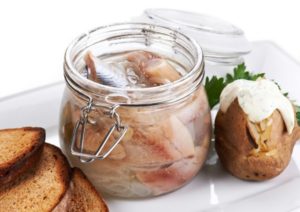
Salted herring
In light of these caveats, it might seem like salted herring isn't good for your body at all. However, you should not go to extremes: herring remains an excellent source of protein, which our body needs for its properties to restore the growth and function of muscle tissues. Also, it is salted herring, due to the contained selenium and omega-3 fatty acids, that benefits in cleansing the blood and reducing the risk of inflammation.And yet, with its frequent use, any benefit can turn into harm: when the concentration of salt in the body with excessive doses of salted herring can increase to the limit.
Herring in oil
In addition to excellent taste, this herring has a number of useful properties: it has the highest content of useful vitamins: A, D, B12. The benefits of herring in oil especially apply to people who suffer from a lack of body weight, and from a lack of fatty acids in the body, vitamin deficiency and hypovitaminosis of vitamins A, D and E. That is why nutritionists strongly recommend including it in their menu - herring in oil normalizes concentration micro- and macroelements in our body, saturates it with essential fatty acids and proteins, benefits the work of the cardiovascular system.
Boiled herring
Despite heat treatment, boiled herring does not lose its properties and benefits at all: the concentration of proteins, fats and trace elements in it remains unchanged. And besides, boiling tends to reduce the salt content in the product. That is why people with hypertension and kidney disease are allowed to eat it, without harm to health.
How to carve a herring
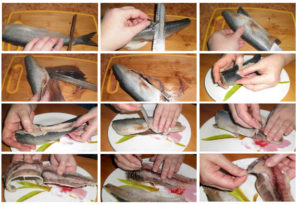
6 steps for the classic herring cut:
Step 1: First you need to cut off the head, tail and pectoral fins of the fish.
Step 2: Cut the abdomen - it is convenient to use a knife or kitchen scissors for this. Then gut the fish.
Step 3: An incision should be made along the fish's back in a straight line from head to tail and the dorsal fin removed.
Step 4: Gently peel the skin of the herring.
Step 5: Separate the ridge of the fish. This should be done in stages, smoothly moving from one part of the fillet to the second.
Step 6: Finally, remove the remnants of the inner film and small bones - the herring fillet is ready for further use!
How to pickle herring
For the marinade you will need:
- 1 glass of boiled water;
- 3 tbsp. l. vegetable oil;
- bay leaf - 1 - 2 pcs.;
- black pepper (peas), salt to taste.

Three easy steps to pickling herring:
- Bring water to a boil, then cool and add a little vinegar.
- Place the herring in the solution, close the lid tightly and leave for 4 - 5 hours at room temperature.
- Refrigerate overnight.
Harm of herring and contraindications to use
Despite the delicious taste and all the positive properties listed above, you need to remember that herring can be both beneficial and harmful to the body.
One of these factors is salt, which must be used with special care - it is important to know that only 1 g of salt is able to bind up to 100 ml of fluid in the body. That is why people with hypertension, a tendency to edema and kidney problems are strongly advised not to abuse this useful product. 100 g of herring can contain from 6 to 15 g of salt, and this is fraught with bad consequences when removing excess salt, the body carries a huge load. As a consequence, fluid retention in the body can provoke harm to disturbances in the functioning of the heart.
Another negative factor is the ability of proteins to release the amino acid tyramine. It, in turn, has the ability to reduce serotonin levels, which can subsequently lead to high blood pressure or severe migraines.
How to choose the right herring
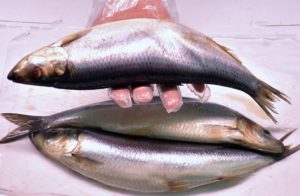
When choosing a herring, it is important to remember 9 useful rules that can later save our health or even our lives.
- First of all, you need to carefully examine the belly of the fish - if blotches or spots are visible on the belly, this is a sign of the presence of diseases.
- You also need to check the elasticity of the herring - for this, it is enough to lightly press on it with your finger. If after pressing the fish there are no dents left, then it is fresh.
- It is recommended to choose the largest fish possible, as small fish have a less pronounced taste.In addition, cutting small fish leaves less useful product, takes much more time and requires more effort.
- Fresh herring should be purchased uncut, as cutting can be used by irresponsible sellers to mask product defects.
- It is not recommended to buy frozen fish. It is better to give preference to freshly frozen herring - it will give the body much more benefit than fillet covered with snow.
- Attention should be paid to the eyes of the herring - they must be clean, without a cloudy film or spots.
- In no case should there be mucus on the body of the fish. At the same time, the skin of the herring should not be overdried: the ideal fish to buy is slightly damp on the surface. The skin of the herring should shine slightly - a dull color is a sign of harm from long-term storage of the product.
- It is necessary to examine the body parts of the herring - its tail and fins must be intact.
- And, of course, the smell of fish: herring has a specific aroma, but if it is suspicious or stale, you should refuse such a purchase.
How and how much herring can be stored

Herring without brine
Its shelf life is the shortest - no more than 2 days. At the same time, the herring itself should be kept in a glass or plastic container, with a tightly closed lid on top. This fish is often kept in the refrigerator shortly before consumption.
Herring in brine
The storage period for such herring is up to 4 weeks. Before refrigerating, the herring should be cut into small pieces and placed in a food container with brine. It is important to note that the liquid must completely cover the fish.
Freezer storage
This storage method is the most convenient if you want to keep the herring for some time. As for the salted herring, if you cut it into pieces and place it in a container, it can be stored in the freezer for about 6 months. This also applies to smoked and pickled herring.
Herring in oil
In this form, herring can be stored for about 4 days. At the same time, the container in which the product is located must be tightly closed to prevent air from entering. It is necessary to keep the container with herring in oil only in the refrigerator.
Conclusion
After getting to know the product a little better, it becomes clear what the benefits and harms of herring are and how it affects our body. In addition to its delicious taste, herring has a lot of useful properties, due to the content of a complex of substances necessary for the body: in particular, Omega-3 fatty acids and proteins.

